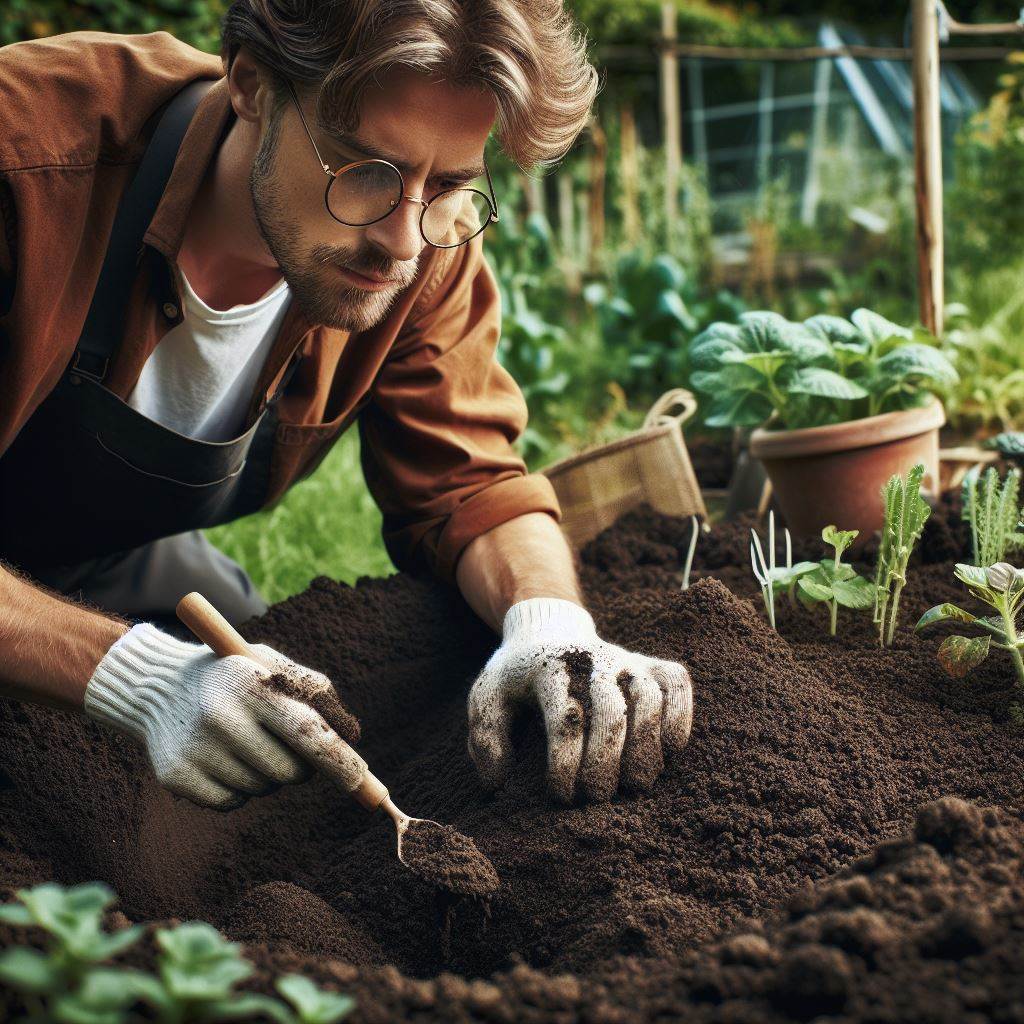Introduction
Importance of soil health for water conservation in gardens
Soil health plays a vital role in water conservation in gardens.
Proper soil management can greatly impact water usage and promote sustainable gardening practices.
This blog post aims to explore the significance of soil health in water conservation and provide valuable insights on improving soil quality.
Water scarcity is a growing global concern, and efficient water management is essential for both the environment and gardeners.
The condition of the soil directly affects its ability to retain water, ensure adequate drainage, and support healthy plant growth.
By understanding and improving soil health, gardeners can reduce water usage and create an eco-friendly garden.
Overview of the blog post’s content
In this blog post, we will delve into various aspects of soil health and its impact on water conservation.
We will discuss the role of organic matter in enhancing soil structure and water retention.
Furthermore, we will explore the significance of proper pH levels and nutrient balance in promoting water efficiency.
Additionally, we will cover different soil management techniques such as mulching, composting, and cover cropping.
These practices not only improve soil health but also aid in water conservation by reducing evaporation and erosion.
By the end of this blog post, readers will have a comprehensive understanding of the importance of soil health in water conservation.
They will also gain valuable insights and practical tips to implement in their gardens, leading to sustainable and water-efficient gardening practices.
Understanding Soil Health
Definition of soil health
Soil health refers to the overall condition of the soil that sustains plant and animal life.
Factors influencing soil health
- Organic matter content: This affects soil fertility, nutrient availability, and water-holding capacity.
- Soil structure and texture: These determine water infiltration, drainage, and root penetration.
- Nutrient availability: The presence and balance of essential nutrients impact plant growth and health.
- pH levels: Soil pH affects nutrient uptake and microbial activity, affecting overall soil health.
Relationship between soil health and water conservation
Soil health plays a crucial role in water conservation in gardens due to the following reasons:
Transform Your Agribusiness
Unlock your farm's potential with expert advice tailored to your needs. Get actionable steps that drive real results.
Get Started- Healthy soil can absorb and store water, reducing runoff and erosion.
- Soil with high organic matter content retains moisture, reducing the need for irrigation.
- Well-structured soil allows water to infiltrate and reach plant roots, optimizing water use.
- Proper nutrient availability promotes plant health, leading to efficient water usage.
- A balanced pH level ensures optimal nutrient uptake and water retention in the soil.
- Soil health enhances the growth of vegetation, providing shade and reducing evaporation.
- Healthy soil supports the growth of cover crops, reducing water loss from bare soil surfaces.
- Improved soil health leads to increased infiltration, recharging groundwater reserves.
- By promoting healthy soil, water conservation in gardens becomes more sustainable.
Incorporating soil health management practices is essential for effective water conservation in gardens.
Read: Container Gardening: Water-Smart Techniques
Benefits of Soil Health for Water Conservation
These benefits can play a significant role in conserving water in gardens and promoting sustainable gardening practices.
By focusing on soil health, gardeners can reduce their water consumption while still achieving successful plant growth.
Increased water infiltration and retention
When water infiltrates into healthy soil, it is stored in the soil’s pore spaces.
This stored water becomes available to plants during dry periods, reducing the reliance on supplemental irrigation.
Additionally, the prevention of water runoff and erosion helps retain water on-site, replenishing groundwater resources and reducing the strain on local water supplies.
Enhanced nutrient and water availability to plants
Furthermore, healthy soil acts as a reservoir for nutrients, improving their availability to plants.
Adequate nutrient availability ensures optimal plant growth and reduces water stress.
By growing plants in nutrient-rich soil, gardeners can achieve healthier and more productive gardens while using less water.
Reduction of watering requirements
Reduced watering requirements are another significant advantage of soil health for water conservation.
With increased water infiltration and retention capacity, gardeners can water their plants less frequently, saving both water and time.
This not only contributes to water conservation but also promotes water efficiency in gardening practices.
Prevention of soil compaction and improved aeration
Soil compaction can severely restrict water movement and root growth.
Healthy soil, on the other hand, has a better structure and texture, allowing roots to penetrate easily and access water and nutrients.
Improved aeration in healthy soil reduces the risk of plant stress due to inadequate oxygen supply.
Preventing soil compaction and maintaining good soil structure are crucial for efficient water utilization in gardens.
In essence, prioritizing soil health in gardens brings numerous benefits for water conservation.
Increased water infiltration and retention, reduction of water runoff and erosion, enhanced nutrient and water availability, reduced watering requirements, and prevention of soil compaction are all advantages of maintaining healthy soil.
By adopting practices that promote soil health, gardeners can play a vital role in conserving water and creating more sustainable gardens.
Read: Urban Green Thumbs: Saving Water in Style

Practices to Improve Soil Health for Water Conservation
Improving soil health is essential for effective water conservation in gardens.
By implementing these practices, gardeners can create a sustainable and water-efficient growing environment.
Addition of organic matter
Adding organic matter is a crucial step in enhancing soil health and conserving water.
Showcase Your Farming Business
Publish your professional farming services profile on our blog for a one-time fee of $200 and reach a dedicated audience of farmers and agribusiness owners.
Publish Your ProfileComposting is a great way to break down organic materials into nutrient-rich amendments that improve soil structure and water retention.
By incorporating compost into the soil, gardeners can create an environment that holds moisture better, reducing the need for frequent watering.
Mulching is another effective practice that helps conserve water in gardens.
Applying a layer of organic mulch, such as wood chips or straw, on the soil surface acts as a protective barrier, preventing water evaporation and keeping the soil moist for longer periods.
Mulching also helps control weed growth, further reducing competition for water.
Proper irrigation practices
Proper irrigation practices play a significant role in water conservation.
Using efficient watering techniques, like drip irrigation or soaker hoses, ensures water is delivered directly to the plant roots, minimizing waste through evaporation or runoff.
It is important to water deeply but less frequently, as this encourages plants to develop deeper root systems that can access water stored deeper in the soil.
Watering in the early morning or late evening also helps minimize water loss due to evaporation.
Cover cropping and crop rotation
Cover cropping and crop rotation are practices that aid in improving soil health and water conservation.
Planting cover crops, such as legumes or grasses, between growing seasons helps prevent soil erosion, replenish nutrients, and improve water infiltration.
Additionally, rotating crops helps break pest cycles and reduces the risk of disease, resulting in healthier plants with improved water uptake.
Minimizing soil disturbance and compaction
Minimizing soil disturbance and compaction is essential for water conservation.
Excessive tilling or using heavy machinery can compact the soil, reducing its ability to absorb and hold water.
By avoiding unnecessary soil disturbance, gardeners can maintain a loose and aerated soil structure, allowing for better water penetration and retention.
Balancing nutrient levels and pH
Balancing nutrient levels and pH is crucial for optimal water conservation in gardens.
Regular soil testing helps determine nutrient deficiencies and pH levels.
By adjusting nutrient levels and pH, gardeners create an optimum environment for plant growth and water absorption.
When soil fertility is well balanced, plants thrive and utilize water efficiently.
In a nutshell, implementing practices such as addition of organic matter, proper irrigation techniques, cover cropping, minimizing soil disturbance, and balancing nutrient levels and pH can significantly improve soil health for water conservation in gardens.
By adopting these practices, gardeners can reduce water usage, promote sustainable gardening, and ensure the long-term health and productivity of their gardens.
Read: Gardening in Drought: Tips for Water Economy
Case Studies or Examples
Garden Success Stories Regarding Soil Health and Water Conservation
- Tom’s Garden: By implementing composting and mulching, Tom was able to improve the soil’s water retention capacity.
- Emily’s Vegetable Patch: Emily used cover crops to prevent erosion and retain moisture in her garden soil, resulting in healthy plant growth.
- Carlos’ Flowerbed: Carlos switched to organic fertilizers and reduced irrigation, creating a thriving flowerbed while conserving water.
Real-Life Examples Demonstrating the Effectiveness of Practices Mentioned
- The RainWise Program in Seattle: This initiative helps homeowners install rain gardens, which promote soil health and water conservation in urban areas.
- The Chena Soil and Water Conservation District in Alaska: Through workshops and demonstrations, they educate farmers on soil health practices that save water and protect the environment.
- The Soil Health Partnership in Iowa: This organization conducts research on cover crops and other strategies to improve soil health and water retention in agricultural areas.
These case studies and examples highlight the positive outcomes of prioritizing soil health for water conservation in gardens.
They demonstrate that implementing practices like composting, mulching, using cover crops, and reducing irrigation can lead to successful gardens with reduced water usage.
Taking inspiration from these success stories, gardeners can adopt similar techniques and contribute to water conservation efforts in their own communities.
Read: Drip Irrigation: Small Farm Water-Saving Guide
Discover More: Eco-Friendly Pest Control in Your Garden
Conclusion
Recap of the importance of soil health for water conservation in gardens
Soil health is vital for water conservation in gardens as it helps retain moisture and prevents runoff.
Healthy soil also supports plant growth and reduces the need for irrigation.
Encouragement to implement practices that improve soil health
To improve soil health, gardeners can add organic matter, such as compost or mulch, to increase nutrient content and enhance soil structure.
Avoiding excessive tilling and using cover crops are other effective practices.
Final thoughts
By prioritizing soil health, gardeners can create a sustainable and water-efficient garden ecosystem.
Healthy soil not only conserves water but also fosters biodiversity and supports overall garden resilience.
It’s time to take action! Start by assessing your garden’s soil health and implementing the necessary practices to improve it.
Remember, small changes can make a big difference in conserving water and promoting a thriving garden ecosystem.
So let’s commit to nurturing the soil beneath our feet and join the movement for sustainable gardening practices.
Together, we can create beautiful and water-wise gardens that benefit both us and the environment.




